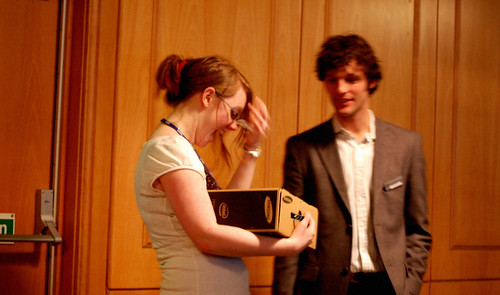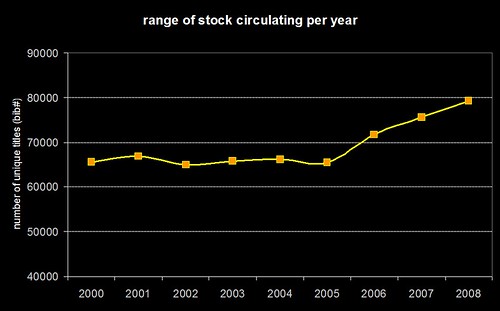Far too tired to blog anything sensible, but wanted to say how much I enjoyed the UKSG 2009 Conference in Torquay 🙂
Looking at the Twitter feed (#uksg09) it sounds like the trains have been atrotious. Hope everyone eventually made it back home in one piece.
I was already full of cold before setting off and it wasn’t until this morning that my ears finally “popped” from the flight down to Exeter on Sunday… just in time for the flight back to Manchester! Once again, now all I can hear is my tinnitus 🙁 Just in case anyone was wondering, that’s why I spent most of the conference sticking my fingers in my ears and shaking my head from side to side 😀
There’s lots of photos from the event on Flickr. However, I must get myself up to a photography course, as only about 10% of all the photos I took were worth uploading. My favourite shots are these two…


…I’ve no idea who any of the people are in the first shot (taken during the Tuesday evening drinks reception), but the second is Clare Duddy with her prize of a new Samsung netbook — many congratulations!
Not sure why, but I’ve not uploaded any photos of the duck that was starring at me through my hotel window… I’ll get photos of it uploaded tomorrow!
It was also great to meet Mike Ellis, and I’ve lost count of all the people I networked with and all of the ideas that sprang from those conversations.
Best of all, someone promised to email me a receipe for how to make limoncello — yay! 🙂
Tag: uksg09
The impact of book suggestions/recommendations?
Whilst finalising my presentation for the 2009 UKSG Conference in Torquay, I thought it would be interested to dig into the circulation data to see if there was any indication that our book recommendation/suggestion services (i.e. “people who borrowed this, also borrowed…” and “we think you might be interested in…”) have had any impact on borrowing.
Here’s a graph showing the range of stock that’s being borrowed each calendar year since 2000…

Just to be clear — the graph isn’t showing the total number of items borrowed, it’s the range of unique titles (in Horizon speak, bib numbers) that have been borrowed. If you speak SQL, then we’re talking about a “count(distinct(bib#))” type query. What I don’t have to hand is the total number of titles in stock for each year, but I’d hazard a guess that it’s been fairly constant.
You can see that from 2000 to 2005, borrowing seems to have been limited to a range of around 65,000 titles (probably driven primarily by reading lists). At the end of 2005, we introduced the “people who borrowed this, also borrowed…” suggestions and then, in early 2006, we added personalised “we think you might be interested in…” suggestions for users who’ve logged into the OPAC.
Hand on heart, I wouldn’t say that the suggestions/recommendations are wholly responsible for the sudden and continuing increase in the range of stock being borrowed, but they certainly seem to be having an impact.
Hand-in-hand with that increase, we’ve also seen a decrease in the number of times books are getting renewed (even though we’ve made renewing much easier than before, via self-issue, telephone renewals, and pre-overdue reminders). Rather than hanging onto a book and repeatedly renewing it, our students seem to be exploring our stock more widely and seeking out other titles to borrow.
So, whilst I don’t think there’s a quick any easy way of finding out what the true impact has been, I’m certainly sat here with a grin like a Cheshire cat!